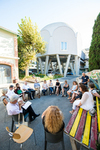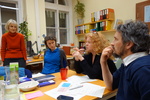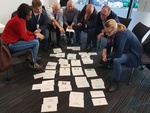Spring 2018: The idea
Claudia Lenz in her double function as EPAN lead expert and NECE advisory board member initiated the focus group on competences for democratic culture.
Autumn 2018: Setting up the structures
polis – the Austrian Centre for Citizenship Education in Schools and the DARE network were commissioned to jointly coordinate the Focus Group.
7 September 2018: NECE Conference 2018
Presentation of the RFCDC Focus Group
As part of the NECE Conference 2018 in Marseille, a “teaser workshop” took place during the IDEA CAMPUS. Claudia Lenz and Patricia Hladschik presented the Reference Framework of Competences for Democratic Culture and its potential for educational processes as well as the idea of the focus group to pilot the RFCDC in diverse educational projects and settings. The general conditions for participating in the focus group were presented. The 15 participants could ask questions, sketch their first ideas for projects and discuss possible cross-border or cross-institutional cooperation. Finally, the procedure for applying for participation in the focus group and the selection criteria were clarified.
4 and 5 February 2019: Kick-off in Vienna
At the kick-off meeting in Vienna representatives of all projects were present. Topics of the meeting:
- Clarification of framework conditions
- Introduction of individual projects in the group
- Development of a schedule for individual projects
- Development of a schedule for the focus group
- Development of a possible impact of the focus group from the perspective of participants, e.g.:
- Provision of case studies of testing RFCDC in different education contexts
- Evaluation of possibilities and limitations in the use of RFCDC
- Recommendations to different education actors regarding RFCDC implementation
24 to 27 October 2019: NECE Conference 2019
- Workshop: Countering Inequalities, fostering Inclusion: What can the Council of Europe’s new “Competences for Democratic Culture” contribute?
The workshop led by Claudia Lenz and Patricia Hladschik provided an introduction to the RFCDC. Members of the NECE focus group shared their experiences with the implementation of the RFCDC in their diverse national and educational context s. Participants of the workshop got familiar with the elements of the reference framework in an interactive setting that would allow them to apply the tool in their own contexts. In the second part of the workshop, participants explored the potential of the reference framework in working with disadvantaged children and adolescents: What can the RFCDC do in concrete terms to counteract inequalities and promote inclusion?
s. Participants of the workshop got familiar with the elements of the reference framework in an interactive setting that would allow them to apply the tool in their own contexts. In the second part of the workshop, participants explored the potential of the reference framework in working with disadvantaged children and adolescents: What can the RFCDC do in concrete terms to counteract inequalities and promote inclusion?
- Second Focus Group Meeting during the open space times. The participants report on the status of implementation and plan the steps up to the next meeting, which will aim to prepare the most important results and recommendations for the NECE Conference 2020. A new member joins the group: Veronika Fehlinger from Land der Menschen Oberösterreich submits the “open mind” project and presents it to the colleagues of the Focus Group.
April 2020: Cancelled Focus Group Meeting
The planned meeting in Vienna was cancelled due to the COVID-19-pandemic. In reaction o the situation and having in mind that the restrictive measures will slow down the implementation processes of the national projects, a no cost extension until December 2020 was negotiated with the NECE partners.
20 May 2020: Third Focus Group Meeting (online)
- Project Updates
- Discussion about the effects of the pandemic on the activities
- Structure of the report developed
- Great to hear that all projects continue.
24 September 2020: Fourth Focus Group Meeting (online)
- Work on recommendations
- Preparation of final report
- Sustainability and continued work
28 September 2020: NECE Campus Online
Workshop “Self-Reflection: Becoming a democratic teacher”
The Council of Europe launched the RFCDC Teacher Self-Reflection Tool to support (student) teachers in developing their democratic professional ethos and competences. The workshop, led by Claudia Lenz and Patricia Hladschik, offered a guided tour through the online version and included the possibility to test parts in small groups. Members of the Focus Group were invited to participate.
5 to 7 November 2020: NECE Conference 2020
Workshop: One framework, many contexts - How can this work? The Council of Europe's Reference Framework of Competences for Democratic Culture and its potential
Workshop jointly curated by the Council of Europe and the NECE focus group. Katerina Toura talked about the Council of Europe’s current strategies and programmes. Thereafter, the members of the focus group presented their key findings and results, came up with personal recommendations, and also talked about challenges and limitations of the RFCDC. The session closed with the presentation and discussion of the recommendations derived from the first set of RFCDC pilot activities.
15 December 2020: Closing meeting of the focus group
- Discussion of the final report
- Presentation of finalised products
- Focus on continued cooperation in new contexts
30 December 2020: Finalisation of documentation
- The RFCDC in the non-formal sector (DARE Blue Lines issue)
- Final report of the focus group
⇒ The selected projects
=> Products and results
⇒ Overview